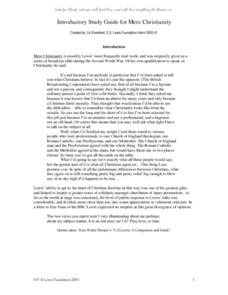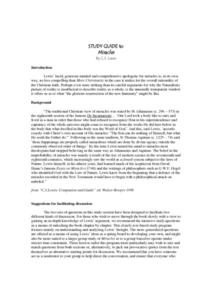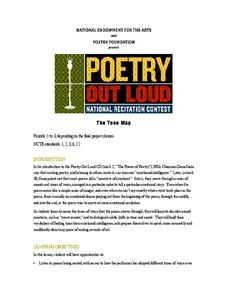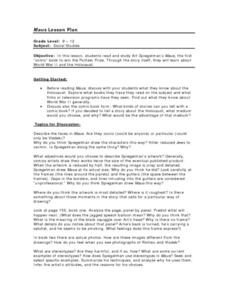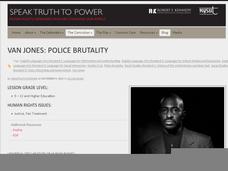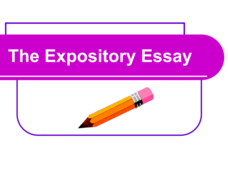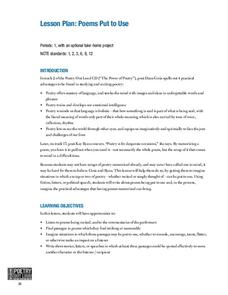Curated OER
Learning Vocabulary by Using Reference Materials
Finding engaging ways to help your middle schoolers build their vocabulary is not easy to do. The lesson presented here offers a great way to motivate them to build vocabulary by making it into a game. Teams of pupils use a dictionary...
C.S. Lewis Foundation
Study Guide to The Abolition of Man
A first-rate resource that tackles the complexity of C.S. Lewis’s The Abolition of Man. It provides a clear plan for analysis, discussion, and exploration. The two sets of questions focus readers to concentrate on the text itself, or to...
C.S. Lewis Foundation
Study Guide to Surprised by Joy
This resource makes accessible the text that portrays the occurrences leading to C.S. Lewis’s finding of God. It encourages the reader to personally reflect upon, and examine Surprised by Joy. The document is divided into two sets where...
C.S. Lewis Foundation
Study Guide to Mere Christianity
Delve into the arguments central to Christianity as C.S. Lewis in Mere Christianity creates a rational case for his religion. Although slightly preachy in its format, this resource fully outlines, in two different sets, the essential...
C.S. Lewis Foundation
Study Guide to Miracles
Teaching is challenging, so is proving through logic that miracles and divine intervention can happen in this world. It is even more arduous to teach the text of that proposition—good thing there are resources available, like this study...
C.S. Lewis Foundation
Study Guide to Letters to Malcolm
C.S. Lewis outlines in his final book Letters to Malcolm: Chiefly on Prayer, the struggle of what happens during prayer, and the purpose of the action. The resource provides two sets of questioning. The first furnishes deep textual...
C.S. Lewis Foundation
Study Guide to The Four Loves
This well-designed, and easy-to-understand study guide is a goldmine in understanding the ideas and philosophies of C.S. Lewis’s The Four Loves. The resource easily breaks down the four loves (affectionate, friendship, romantic, and...
C.S. Lewis Foundation
Study Guide to The Great Divorce
Break the content and theological barriers of C.S. Lewis’s The Great Divorce with the ideas and suggestions available for analysis and discussion using an easy-to-understand study guide. This stupendous resource introduces Lewis’s...
Curated OER
The Tone Map
Poems are meant to be heard. Hearing a poem being read enriches one’s understanding of the tone and mood of the piece. Introduce your class to the sounds of poetry with a packet that not only details how to use poetry recordings in the...
Curated OER
Maus Lesson Plan
The artistic choices Art Spiegelman made in his graphic novel, Maus, are the focus of an exercise that asks class members to compare classic comic book forms with Spiegelman’s panels and frames. Directed to specific pages and guided by a...
Curated OER
Writing a Topic Sentence
Here is an inventive, and easy-to-implement lesson on the writing of topic sentences. Learners review what a topic sentence is, practice identifying topic sentences in an informational article, then play a really cool game. All of the...
John F. Kennedy Presidential Library & Museum
Analyzing the Rhetoric of JFK’s Inaugural Address
“And so, my fellow Americans: ask not what your country can do for you—ask what you can do for your. country.” Did you know that John Kenneth Galbraith, Adlai Stevenson, and Theodore Sorensen helped John F. Kennedy craft his 1961...
Smith Family Home
Transportation
Here's an interesting lesson that combines elements of language arts, sociology, and a study of the many ways that people use transportation to get from one place to another. The eight-page plan includes worksheets and a word search that...
Robert F. Kennedy Center for Justice and Human Rights
Vaclav Havel: Free Expression
Develop an understanding of universal human rights, particularly the freedom of expression, with the questions and activities that analyze the conflicts of Vaclav Havel. Learners define, interpret and rephrase the human rights article in...
Robert F. Kennedy Center for Justice and Human Rights
Juliana Dogbadzi: Slavery/Trafficking
Progress your learners' comprehension of universal human rights by exploring the violation of human trafficking through the experiences of Juliana Dogbadzi. This activity analyzes and discusses very sensistive and graphic issues but is...
Robert F. Kennedy Center for Justice and Human Rights
Van Jones: Police Brutality
Develop an understanding of how the media and society are connected and responsible for the defense of universal human rights. Learners investigate and examine the conflicts of police brutality as it is portrayed in the media and through...
The New York Times
Big Brother vs. Little Brother: Updating Orwell's 1984
Government surveillance is an enduring conflict that has become increasingly complex with our nation's use of technology. Add to the understanding of Orwell’s 1984 by using the resources here that display the contemporary actions of Big...
jc-schools
The Expository Essay
Did you ever create an awesome graphic organizer only to find that your class was completely baffled by how to use it? This resource not only provides you with a great graphic organizer for a standard five-paragraph essay, but also...
Thirteen Ed Online
What is Conceptual Art?
Research, art history, and web page creation! Sounds too good to be true. With tons of links and resources, the instructional activity provides you with everything needed to engage the class in an amazing art and research activity. They...
PBS
Journalism in War Time: What Does the Public Need to Know?
A viewing of the documentary War Feels Like War, launches an exploration of the importance of accurate and comprehensive war reporting. Groups investigate various news agencies and assess the factors that influence their stories. A...
PBS
Baseball: The Tenth Inning
Bring the historical relevance of baseball into the classroom, as pupils discover the lessons learned from the breaking of baseball's color barrier by Jackie Robinson. Learners view video and analyze Robinson’s character, as well as his...
Poetry Out Loud
Poems Put to Use
Why do we have to study poetry? Here is a lesson that demonstrates some of poetry's more practical and real-world applications for reluctant learners. Start by leading a brainstorming session about where poems or pieces of poems might be...
New Vista Middle School
Hyperboles
Turn hyper bowls into hyperboles that will take away the breath of your principal and learners with the knowledge available in this presentation. The PowerPoint provides very clear and accurate information that breaks down how hyperboles...
Curated OER
Guess Who's Coming to Dinner?
Who would you love to see at your table? Groups research a decade, ranging from the 1840s to the 1960s, read a short story associated with that decade, and plan a dinner party, complete with table set-up and menu. After researching...





